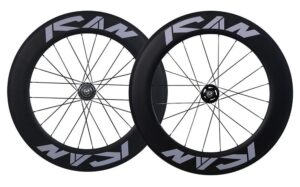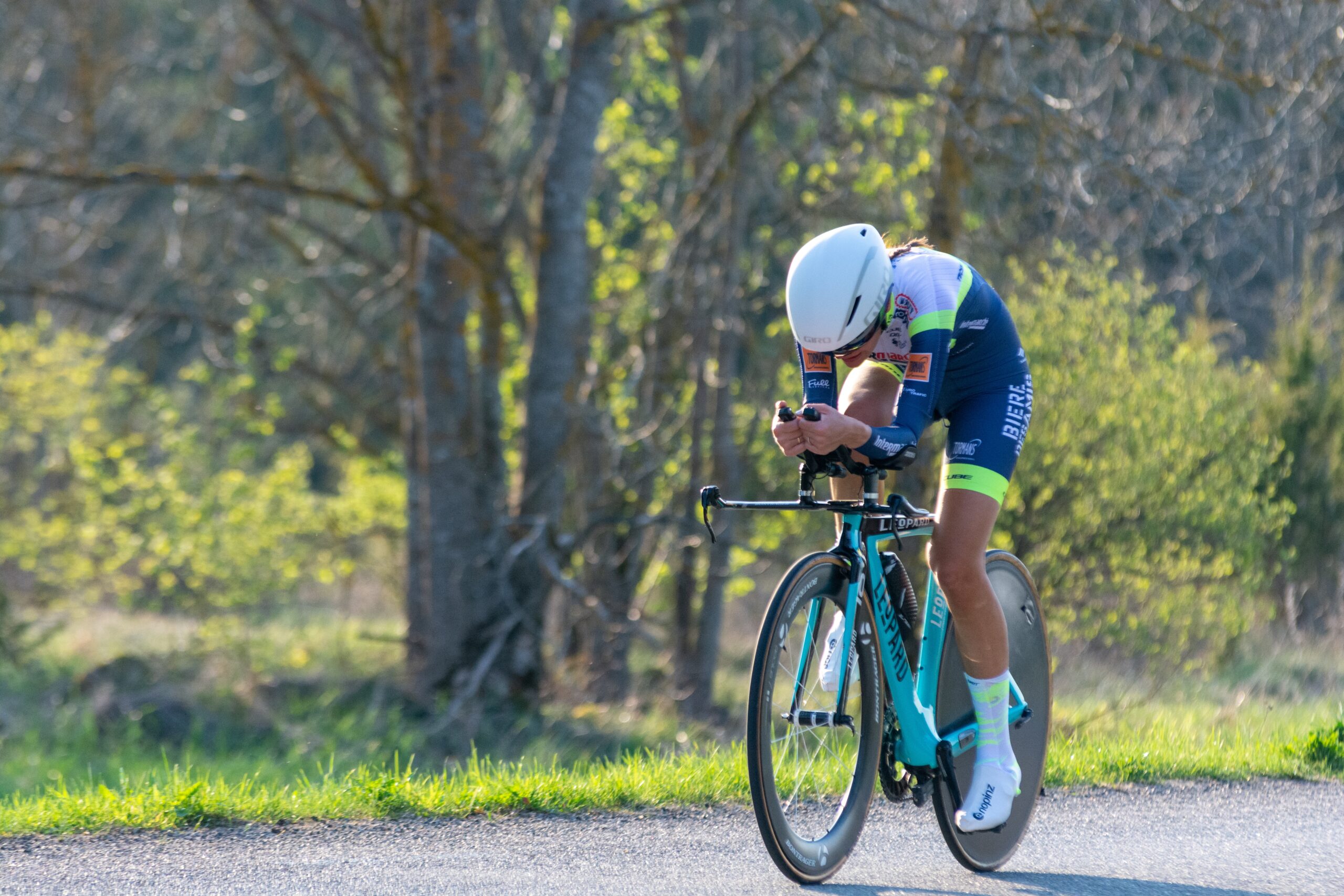The most common question I was asked before my first Ironman was, “What time are you shooting for?” In my naiveté, I always responded, “Well, if all goes well, under X hours” (I will keep you in suspense until the end of the article before I tell you how I did). If you answer this question as I did, you are creating two often unrealistic expectations. First is the expectation that you can achieve a certain race time that you have set for yourself. Given the vagaries of Ironman racing, becoming too fixated on a specific finish time can cause tremendous pressure before the race and potentially great disappointment after the race.
 Second is the expectation that all will go well. One of the great lessons I learned about Ironmans in particular and triathlon in general is: All never goes well! Because there are so many things that can go wrong in a triathlon—equipment, physical, mental, logistics, weather—by simple odds, something will go wrong. It’s Murphy’s Law 140.6 fold for an Ironman and a similar exponential effect for shorter triathlons.
Second is the expectation that all will go well. One of the great lessons I learned about Ironmans in particular and triathlon in general is: All never goes well! Because there are so many things that can go wrong in a triathlon—equipment, physical, mental, logistics, weather—by simple odds, something will go wrong. It’s Murphy’s Law 140.6 fold for an Ironman and a similar exponential effect for shorter triathlons.
If you are incredibly well prepared—and lucky—only one or two things will go wrong and you can only hope that the problems don’t end your day and you can still cross the finish line, pick up your medal, and revel in your race. I was fortunate in my first Ironman; only one major thing went wrong (and it was major!). I had stomach distress (that’s a euphemism for what I really had!) during the first half of the marathon and I stopped nine—you heard me—nine times (I counted because I didn’t want it sound like I was telling a fish story). I was lucky that I got it out of my system at the end of the first half of the run and it didn’t bother me the rest of the race.
The best way to increase the likelihood that at least most goes well is to take preventive measures. Figure out everything that can go wrong and take steps to keep those things from happening. Make sure you have your nutritional needs tested in training and dialed in for your race. Inspect all of your equipment—twice! Check the weather and have the proper gear. Have a checklist to ensure that you don’t forget anything. And have a plan for each phase of the race including the layout and process of your transitions.
 Then, live by the adage, “The best laid plans of mice and men…” The reality of triathlon is that no matter what you do to prepare yourself and try to prevent problems from arising, s#*& happens. What will determine whether the bad thing ruins your race or is just bump in the road is your attitude. You can get upset, not solve the problem, and have it end your race. Or you can accept it, find a solution, and get back to doing the best you can given the unfortunate realities of our sport.
Then, live by the adage, “The best laid plans of mice and men…” The reality of triathlon is that no matter what you do to prepare yourself and try to prevent problems from arising, s#*& happens. What will determine whether the bad thing ruins your race or is just bump in the road is your attitude. You can get upset, not solve the problem, and have it end your race. Or you can accept it, find a solution, and get back to doing the best you can given the unfortunate realities of our sport.
In our result-driven triathlon culture, many triathletes can feel tremendous pressure to not only finish—which is a big enough accomplishment—but to finish a race in a certain time. This is especially prevalent in Ironman events. But if you focus too much on the time you want to achieve, it will slowly grow into an “outcome expectation” that you MUST achieve, or you will have failed. This expectation will become a burden to you, cause you to feel great pressure to achieve the expectation, and lead to pre-race doubt, worry, and anxiety. Paradoxically, emphasizing your outcome expectation will actually interfere with you meeting that expectation, interfere with your enjoyment of the race, and quite possibly keep you from achieving your goal.
 When you say “If all goes well…,” you are setting yourself up for failure because you may not have control over your finish time and you certainly don’t have control over everything that happens between the start of the swim and the conclusion of the run. My recommendation is to avoid creating expectations over which you have no control.
When you say “If all goes well…,” you are setting yourself up for failure because you may not have control over your finish time and you certainly don’t have control over everything that happens between the start of the swim and the conclusion of the run. My recommendation is to avoid creating expectations over which you have no control.
Expectations can develop in several ways. They can arise when you compare yourself to others with whom you train—“If I can keep up with him/her in training and he/she did an Ironman in such-and-such a time, I know I can hit that time too.” You can also develop unrealistic expectations as you gain fitness and speed in your training. As your confidence in your conditioning builds, so can your expectations. A particularly dangerous way expectations can arise is when you try to extrapolate your training and previous race times to your upcoming big race—“If I did a three-hour Olympic distance and a 7:30 half-Ironman, that means I can go under 13 hours for my Ironman.”
 I learned this lesson firsthand in my first Ironman, Ironman USA in Lake Placid, NY. Having come from running, I never felt the slightest bit of anxiety before my numerous marathons. But in the days leading up to Lake Placid, I was really nervous. I felt awful, was definitely not enjoying my Ironman experience, and was not looking forward to the race. At the heart of my angst was pressure I felt to achieve my time expectation and a persistent fear that I would go out too hard, bonk early, and have many hours of self-induced suffering (or, even worse, have to drop out). Two days before the race, I called my coach and told him how I felt. He said that my feelings were natural because I had chosen to undertake a monumental challenge and that the best way to let go of the anxiety was to let go of my outcome expectations. He told me to focus on three things: enjoying myself, maintaining a comfortable pace, and finishing strong.
I learned this lesson firsthand in my first Ironman, Ironman USA in Lake Placid, NY. Having come from running, I never felt the slightest bit of anxiety before my numerous marathons. But in the days leading up to Lake Placid, I was really nervous. I felt awful, was definitely not enjoying my Ironman experience, and was not looking forward to the race. At the heart of my angst was pressure I felt to achieve my time expectation and a persistent fear that I would go out too hard, bonk early, and have many hours of self-induced suffering (or, even worse, have to drop out). Two days before the race, I called my coach and told him how I felt. He said that my feelings were natural because I had chosen to undertake a monumental challenge and that the best way to let go of the anxiety was to let go of my outcome expectations. He told me to focus on three things: enjoying myself, maintaining a comfortable pace, and finishing strong.
 As soon as he suggested this, I immediately felt as if a huge weight had been lifted off my shoulders. In the last 48 hours, I had fun and felt excited about the race. Before the race, I decided to take his advice to the extreme. I put a piece of tape over the time part of my watch so I couldn’t see how I was doing. I also taped over my bike computer so I wouldn’t see my time, miles per hour, or the miles I was covering. In fact, I didn’t think about my race time at all until mile 19 of the marathon when I happened to notice the time of day (I then naturally calculated my race time and how I was doing in pursuit of my time goal; more on that shortly).
As soon as he suggested this, I immediately felt as if a huge weight had been lifted off my shoulders. In the last 48 hours, I had fun and felt excited about the race. Before the race, I decided to take his advice to the extreme. I put a piece of tape over the time part of my watch so I couldn’t see how I was doing. I also taped over my bike computer so I wouldn’t see my time, miles per hour, or the miles I was covering. In fact, I didn’t think about my race time at all until mile 19 of the marathon when I happened to notice the time of day (I then naturally calculated my race time and how I was doing in pursuit of my time goal; more on that shortly).
By freeing myself of my time expectation through most of the race, I relieved myself of the pressure to achieve it when just finishing an Ironman was sufficiently daunting and accomplishment enough. Instead, I focused on what I needed to do to have a good race. In the swim, I concentrated on not getting pummeled at the start, staying relaxed, maintaining good form, and conserving my energy. On the bike, I paid attention to my pace; riding conservatively, making sure I stayed in my aerobic zone, and fueled and hydrated frequently. During the run, I focused on keeping a comfortable stride and continuing to fuel and hydrate.
 Now the suspense will end. At mile 19, I was feeling amazingly good. I also realized that, at my current pace, I would miss my time goal, though not by much. So, I decided to let myself go. I attacked the last seven miles and finished in a rush and on a high. And guess what? I achieved my time goal—under 12 hours—to boot!
Now the suspense will end. At mile 19, I was feeling amazingly good. I also realized that, at my current pace, I would miss my time goal, though not by much. So, I decided to let myself go. I attacked the last seven miles and finished in a rush and on a high. And guess what? I achieved my time goal—under 12 hours—to boot!
I have learned my lesson. From now on, when I am asked “What time are you shooting for?,” I smile knowingly and say, “I’ll give my best effort, I will have fun, and I will finish.” In triathlon, unless you’re a pro or a top age-grouper, everything else is just icing on the cake.
Do you want to take the next step in training your mind to perform your best in training and on race day? Here are five options for you:
- Read my Triathlon blog.
- Listen to my Train Your Mind for Athletic Success
- Read my latest mental training book: Train Your Mind for Athletic Success: Mental Preparation to Achieve Your Sports Goals.
- Take a look at myonline mental training courses.
- Schedule a 1:1 session with me.







